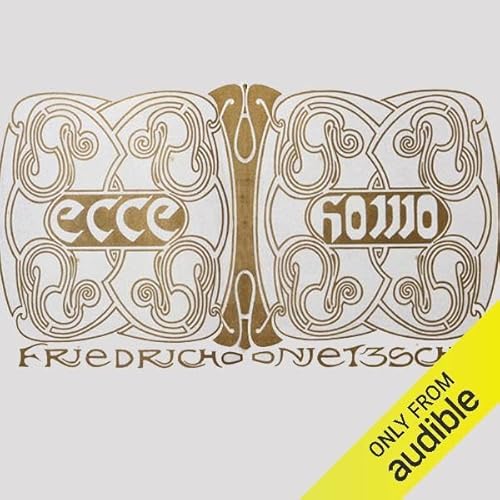
Ecce Homo
How One Becomes What One Is
Échec de l'ajout au panier.
Veuillez réessayer plus tard
Échec de l'ajout à la liste d'envies.
Veuillez réessayer plus tard
Échec de la suppression de la liste d’envies.
Veuillez réessayer plus tard
Échec du suivi du balado
Ne plus suivre le balado a échoué
0,00 $ pour vos 30 premiers jours
OFFRE D'UNE DURÉE LIMITÉE
0,99 $/mois pendant vos 3 premiers mois
L'offre prend fin de 29 janvier 2026 à 23 h 59, HP.
Vos 3 premiers mois d'Audible à seulement 0,99 $/mois
1 nouveauté ou titre populaire à choisir chaque mois – ce titre vous appartiendra.
L'écoute illimitée des milliers de livres audio, de balados et de titres originaux inclus.
L'abonnement se renouvelle automatiquement au tarif de 0,99 $/mois pendant 3 mois, et au tarif de 14,95 $/mois ensuite. Annulation possible à tout moment.
Choisissez 1 livre audio par mois dans notre incomparable catalogue.
Écoutez à volonté des milliers de livres audio, de livres originaux et de balados.
L'abonnement Premium Plus se renouvelle automatiquement au tarif de 14,95 $/mois + taxes applicables après 30 jours. Annulation possible à tout moment.
Acheter pour 13,98 $
-
Narrateur(s):
-
Steven Van Doren
-
Auteur(s):
-
Friedrich Nietzsche
À propos de cet audio
Ecce Homo also forcefully repudiates those interpretations of his previous works purporting to find support there for imperialism, anti-Semitism, militarism, and Social Darwinism.
Nietzsche strives to present a new image of the philosopher and of himself as a philosopher. He expounds upon his life as a child, his tastes as an individual, and his vision for humanity. On these grounds, some consider Ecce Homo a literary work comparable in its artistry to Van Gogh's paintings.
Public Domain (P)2009 Blackstone Audio, Inc.
Pas encore de commentaire


